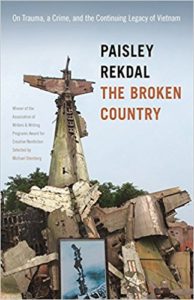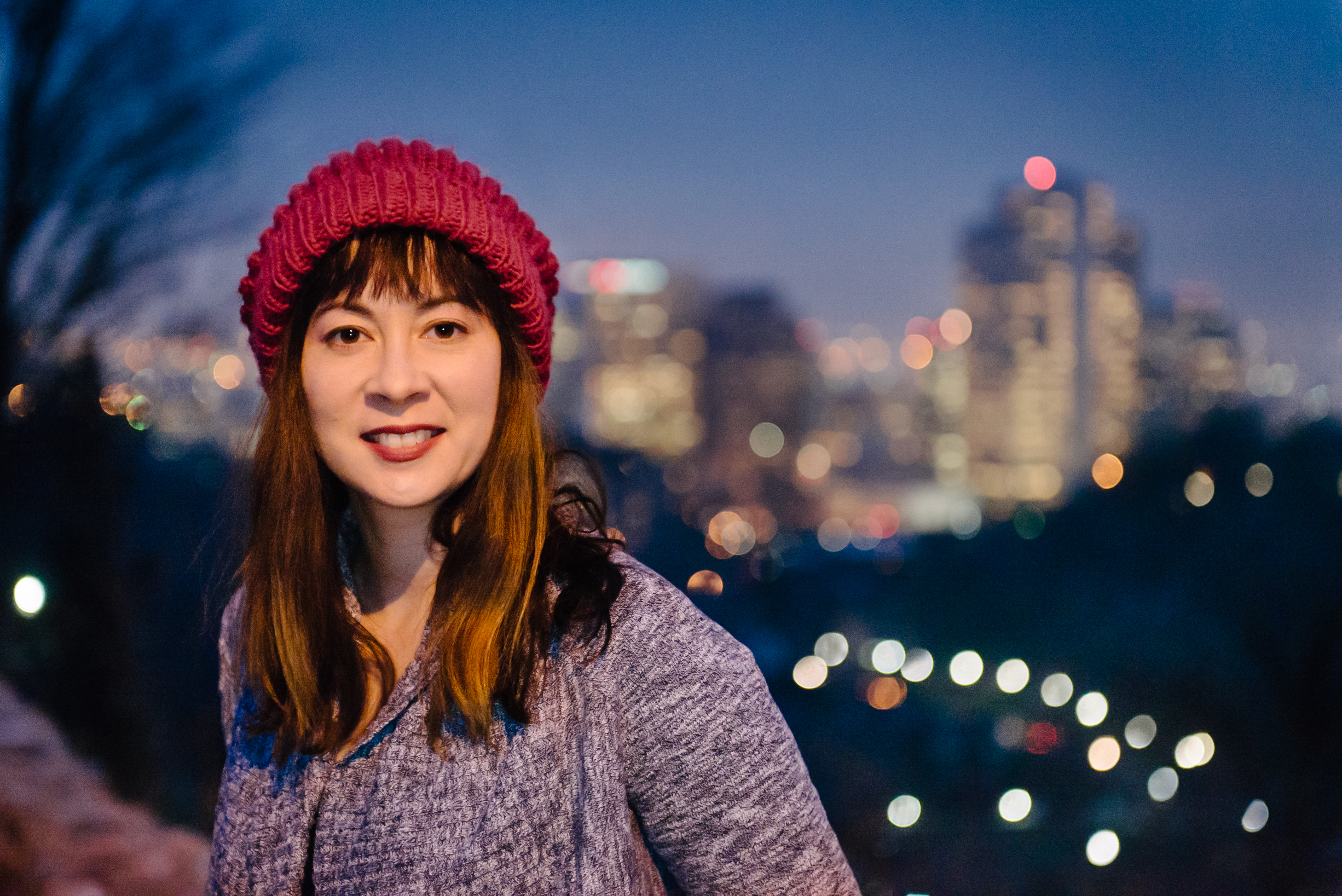Paisley Rekdal is a professor of English at the University of Utah and the current Poet Laureate of the state of Utah. She has been honored with a National Endowment for the Arts Fellowship, a Pushcart Prize, and a Fulbright Fellowship to South Korea. Her new book, “The Broken Country,” comes out Sept. 15, 2017. It is available through Powell Books, Amazon, or your local bookstore.
Molly Higgins (MH): Please introduce yourself and briefly describe your literary work and career path to date.
Paisley Rekdal (PK): I’m the author of five books of poetry and three books of nonfiction: “The Night My Mother Met Bruce Lee,” “Intimate,” and now “The Broken Country.” I was born in and have lived for most of my life in Seattle, and I currently live in Utah, where I’m the state’s Poet Laureate. I’ve been writing since I was in high school, but really learned how to become a professional writer during my time in the MFA program at the University of Michigan. I teach at the University of Utah.
MH: “The Broken Country” explores trauma, mental illness, and the long-lasting effects of war. Did your research change your perceptions of how war influences mental illness and trauma?
PK: It absolutely did. I think, like a lot of people, I wanted to believe that we are each in control of all the decisions that we make. My research into the heritability of trauma and the long-term affects of war on families and communities over time, however, taught me that ideas of “responsibility” and even “individuality” get blurry—inheriting a parent’s or even a grandparent’s trauma can change your own physical responses to stress that are utterly beyond our control. This is not to say that we cannot each be held responsible for our actions, or our drug and alcohol abuse, but that we also can’t divorce these problems from the legacies of war. When it comes to mental illness, my research also taught me that our continual shrinking of state and federal mental health care budgets and support have particularly devastating consequences for the veterans and non-combatant survivors of war–something we need to talk more about.

MH: Throughout the book you’re very transparent about the ways that your identity as a mixed race Asian American and as the relative of veterans affects your relationship to the book’s events. Do you think your personal identity influences the way your writing is perceived or the diversity of your readership? How?
PK: I do think my personal identity influences the way my writing is perceived. In the case of “The Broken Country,” my personal experience as a biracial woman and the relative of two Vietnam veterans likely gives me some level of authority to discuss issues that are relevant both to Asian Americans and Vietnam veterans’ families. But I am also not Vietnamese American, which is very important: as a half-Chinese woman whose family emigrated here under very different circumstances, whose family has had far more resources available to them, I come from a very privileged place. “Asian American” lumps together an enormous number of cultures and community experiences together under one political term, but that does not mean we experience the same America. In that sense, I would imagine that a Southeast Asian readership would, and should, be more critical of my take on the events in the book.
MH: Near the end of the book, you say that “a monument tells us war is over. But everything about the ways we process war suggests it never is.” The line stuck with me because I was reading this shortly after the white supremacist rally and counter protest in Charlottesville. What are your thoughts on the current debate about the persistence and influence of Confederate monuments?
PK: The powerful emotions still evoked by these monuments show how long wars stay alive in our cultural imagination, and in our families: in some ways, we are still fighting the Civil War. As for removing these monuments, I disagree with Trump’s “slippery slope” argument regarding monument removal. His argument that removing a monument to Lee will naturally lead to wanting to remove a monument to Jefferson continues the common elision of fact with historical interpretation. Monuments may be based on some level of historical fact–this general existed, that battle was fought–but their power is due to the fact that they are interpretations of fact. Monuments and memorials are part elegy, part civic propaganda: they exist in that strange place where political fantasy meets history meets aesthetics. To take down the monument isn’t to erase history, but to erase the particular civic interpretation of that history.
That said, while I strongly support the groups who want to remove the monuments, and absolutely understand the reasons to do so, I myself am curious about what would happen if we kept them standing, with the legal requirement that memorials and monuments to the African Americans that built so much of the infrastructure of this nation be built and placed in visual sightline of–perhaps even in visual contest with—every single one of the confederate monuments. If the monuments can ever be useful, perhaps it will be by reminding us of the ways that our racist imagination works and worked, an imagination that can now be actively challenged by new monuments that force us to revise our original “seeing” of these racist tropes. In this way, I would hope that these monuments’ interpretations may be implicitly critiqued and diminished, that they would stand as instructional, and not aspirational, modes of viewing history.
Perhaps I’m wrong about this, and there’s no way that these monuments’ social meaning can be rewritten short of removal. Certainly, I am not one of the people who has the moral right to decide what happens to these monuments. But I suspect that part of the fury around these statues is that the people these monuments would erase are still made less visible by the fact that they have been denied the opportunity to carve their history into the mountains of the South and the West, into the marble of our municipal courthouses and buildings, and to place their stories in the squares and schools and civic parks that decorate daily American life. We have no great proliferation of monuments and memorials to the African Americans who were enslaved and slaughtered by and who ultimately survived the Confederates: at the very least, this time should also be a call for that.

MH: We’re always looking for more to read. Who are five authors we should we be reading?
PK: I’ve been loving the work of Suzanne Buffam (“A Pillow Book”), Brandon Som (“The Tribute Horse”), Robyn Schiff (“A Woman of Property”), Vhi Khi Nao (“Fish in Exile”) and Ted Chiang (“Arrival”).
MH: You’re being interviewed by a librarian, for an audience of progressive Asian American librarians. What are your thoughts on libraries, and their place in supporting diverse communities?
PK: I literally could not do my work without the help of libraries and librarians: they are the cornerstone of American literature. I think bringing the work of diverse writers into libraries, and partnering with local educational and cultural institutions to bring in diverse writers, can only enrich communities. The University of Utah Creative Writing program recently worked with the Salt Lake City Downtown Public Library to bring in Viet Thanh Nguyen, and the response in the Vietnamese community was phenomenal. We gave away free books, and had lunch as well as evening readings/talks with Nguyen that many from the Vietnamese community attended. People were genuinely excited about these events, and I think this made the Vietnamese community feel more connected to their library.
MH: What advice would you give young professionals, especially those from diverse backgrounds, who are interested in a career in writing, especially in nonfiction?
PK: Learn to love research, and learn to accept and take (intelligent) criticism from editors, agents, and friends. These are the only tools that can help make you a better writer. That, and develop a good exercise plan to help release the stress from writing. It’s a long slog to create a book: stay in shape.
Editing assistance provided by Shanna Kim.

